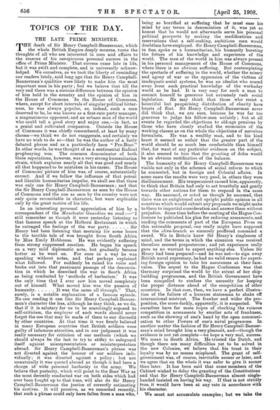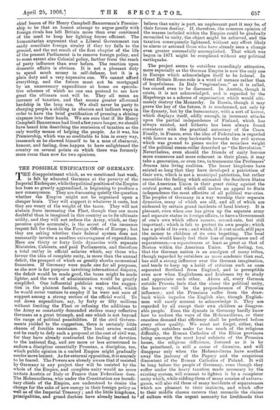TOPICS OF THE DAY.
THE LATE PRIME MINISTER. THE death of Sir Henry Campbell-Bannerman, which the whole British Empire deeply mourns, turns the thoughts of all who are interested in men and affairs to the reasons of his conspicuous personal success in the office of Prime Minister. That success came late in life, but it was swift and complete, and is universally acknow- ledged. We ourselves, as we took the liberty of reminding our readers lately, said long ago that Sir Henry Campbell- Bannerman's qualities were likely to make him the most important man in his party ; but we believe that till the very end there was a curious difference between the opinion of him held in the country and the opinion of him in the House of Commons. In tha House of Commons, where, except for short intervals of singular political bitter- ness, be was always popular, as, indeed, such a man deserved to be, lie was known as a first-rate party manager, a magnanimous opponent, and an urbane man of the world who could tell a good story and enjoy one,—in fact, as a genial and cultivated companion. Outside the House of Commons it was chiefly remembered, at least by many classes—we think we do not exaggerate, and certainly we have no wish to do so—that he was the author of a hotly debated phrase and as a particularly keen "Pro-Boer." In other words, he was thought of as a sentimental Radical prophesying woe. The common denominator of both these reputations, however, was a very strong humanitarian strain, which explains nearly all that was good and nearly all that happened to be mistaken in his career. The House of Commons' picture of him was, of course, substantially correct. And if we follow the influence of that potent and likeable humanitarian impulse, we shall see that there was only one Sir Henry Campbell-Bannerman; and that the Sir Henry Campbell-Bannerman as seen by the House of Commons and the one as seen by the country were not only quite reconcilable in character, but were explicable only by the great motive of his life.
• In an interesting personal appreciation of him by a correspondent of the Manchester Guardian. we read :—" I still remember as though it were yesterday listening to that famous speech at the Holborn Restaurant in which he outraged the feelings of the war party Sir Henry had been listening that morning for some hours to the terrible tale of woe brought from South Africa by Miss Emily Hobhouse. He was evidently suffering from strong suppressed emotion. He began his speech on a very mild diplomatic note, but gradually became hotter as he went on. For once in a way he was speaking without notes, and that perhaps explained what followed. For suddenly he raised his voice and broke out into that passionate passage of the denuncia- tion in which he described the war in South Africa as being conducted by 'methods of barbarism.' It was the only time that I ever saw him moved completely out of himself. What moved him was the passion of humanity It was the same all through." That, surely, is a notable explanation of a famous episode. No one reading it can like Sir Henry Campbell-Banner- man's character the less, although he may think, as we do, that if it is salutary for us- to be searchingly exposed to self-criticism, the employer of such words should never forget the use that may be made of them to our discredit by other countries. At that time it was firmly believed in many European countries that British soldiers were guilty of infamous atrocities, and in our judgment it was really necessary for criticism of our methods (which we should always be the last to try to stifle) to safeguard itself against misrepresentation or misinterpretation abroad. Sir Henry Campbell-Bannerman's phrase was not directed against the honour of our soldiers indi- vidually; it was directed against a policy ; but not unnaturally it was quoted abroad as though it had been a charge of wide personal barbarity in the army. We believe that posterity, which will point to the Boer War as the most decently conducted war on both sides which had ever been fought up to that time, will also do Sir Henry Campbell-Bannerman the justice of correctly estimating his motives. It will perceive, as we remarked recently, that such a phrase could only have fallen from a man who, being so horrified at suffering that he must ease his mind by any terms in denunciation of it, was yet so honest that he would not afterwards serve his personal political prospects by making the modifications and reservations that a self-seeking, ambitious man would doubtless have employed. Sir Henry Campbell-Bannerman, in fine, spoke as a humanitarian, his humanity bursting the fetters of his knowledge and experience of the world. The man of the world in him was always present in his personal management of the House of Commons, where there is no obvious suffering. But contemplating the spectacle of suffering in the world, whether the misery and agony of war or the oppression of the victims of inadequate social systems, he was an idealist who soared away from such practical knowledge of the workaday world as he had. It is very easy for such a man to commit himself to generous but extremely rash social legislation. He may think that those who resist a bountiful but pauperising distribution of charity have hearts of flint. Sir Henry Campbell-Bannerman never did think that, we are sure, because he was far too generous to judge his fellow-men unfairly ; but at all events he regarded the objections to old-age pensions by those who have closely studied the economics of the working classes as on the whole the objections of nerveless formalists. He was a wealthy man, and to his kind heart it seemed so unfair that the greater part of the world should be so much less comfortable than himself that, for want of any particular evidence on the subject, it also seemed to him that the granting of doles would be an obvious rectification of the balance.
The humanity of Sir Henry Campbell-Bannerman was visible not only in the schemes of social reform to which he consented, but in foreign and Colonial affairs. In some cases the results were very good, in others they were disillusionment. His temperament caused him, apparently, to think that Britain had only to act trustfully and gently towards other nations for them to respond in the same way. He assumed, or acted as though he assumed, that there was an enlightened and upright public opinion in all countries which would submit auy proposals we might make to them to impartial consideration and answer them without prejudice. Some time before the meeting of the Hague Con- ference he published his plan for reducing armaments, and reading the comments of part of the European Press on this estimable proposal, one really might have supposed that the olive-branch so sincerely proffered. concealed• a sword. We in Britain knew Sir Henry's singleness of mind, and the terms in which the eirenicon was received therefore seemed preposterous ; and yet experience really gave us no warrant to expect anything else. Unless Sir Henry bad been prepared—and he was not—to sign away British naval supremacy, lie had no valid reason for expect- ing foreign opinion to take his assurances at their face- value. The sequel to the Hague Conference was that Germany surprised the world by the extent of her ship- building programme, and the British Government have been compelled to confess the necessity for keeping the proper distance ahead of the competition of other countries. In that case, then, we have a perfect illustra- tion of the failure of a humane statesman to shake off international mistrust. The franker and wider the pro- position, the more darkly, apparently, it is suspected. We ourselves have far more hopes of checking the ruinous competition in armaments by smaller acts of frankness, such as the showing of one's hand by the open communi- cation to other Powers of one's naval programme. In another matter the fashion of Sir Henry Campbell-Banner- man's mind brought him a very pleasant, and—though the evidence is not yet complete—we hope a very real, success. We mean in South Africa. He trusted the Dutch, and though there are many difficulties yet to be solved in the new Colonies, vie believe that his trust in their loyalty was by no means misplaced. The grant of self- government was, of course, inevitable sooner or later, and. we agree that on the whole it was safer to give it sooner than later. It has been said that some members of the Cabinet wished to delay the granting of the Constitutions and that Sir Henry Campbell-Bannerman almost single- handed insisted on having his way. If that is not strictly true, it would have been at any rate in accordance with his character.
We must not accumulate examples; but we take the chief, lesson of Sir Henry Campbell-Bannerman's Premier- ship to be that an honest attempt to argue gently with foreign rivals has left Britain more than ever convinced of the need to keep her fighting forces efficient. The humanitarian argument that a Liberal Government can easily conciliate foreign rivalry if they try falls to the ground, and the net result of the first chapter of the life of the present Parliament is to remove foreign policy, and to some extent also Colonial policy, farther from the reach of party influence than ever before. The reaction upon domestic affairs is obvious. It is not a pleasant duty to spend much money in self-defence, but it is a plain duty and a very expensive one. We cannot afford everything, and the future must not be mortgaged by an unnecessary expenditure at home on specula- tive schemes of which no one can pretend to see how great the ultimate cost will be. They all mean an increase of taxation, and that means greater all-round hardship in the long run. We shall never be party to charging people a shilling in obscure and indirect ways in order to have the brief gratification of pressing a shining sixpence into their hands. We are sure that if Sir Henry Campbell-Bannerman had lived a few years longer, we should have heard him describing the remission of taxation as the only worthy means of helping the people. As it was, his Premiership, which was so creditable to him in every way, inasmuch as he showed himself to be a man of character, honour, and feeling, does happen to have enlightened the country on several points on which there was formerly more room than now for two opinions.























































 Previous page
Previous page